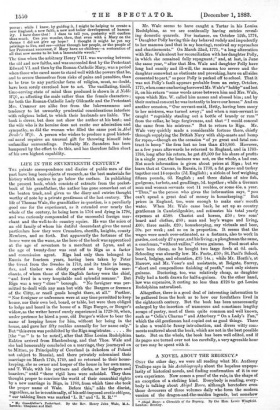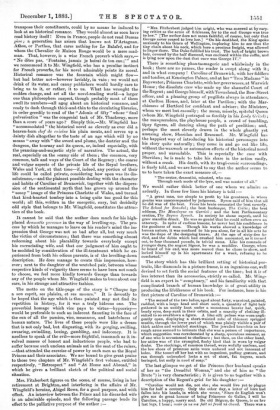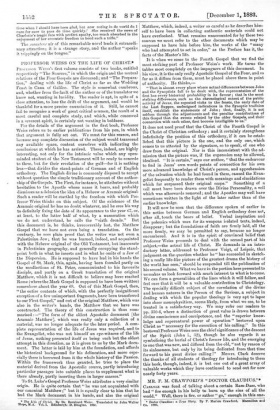A NOVEL ABOUT THE REGENCY.*
Ofav the other day, we were all reading what Mr. Anthony Trollope says in his Autobiography about the hopeless unpopu- larity of historical novels, and finding confirmation of it in our own experience. Now comes a proof of the rule, in the shape of an exception of a striking kind. Everybody is reading, every- body is talking about Abigel Bowe, although heretofore even those devourers of three volumes daily who form the modern version of the dragon-and-the-maiden legends, but somehow • Abigel Rowe: a Chronicle of the Regency. By the Hon. Lewis Wingfield. London : Bentley. transpose their constituents, could by no means be induced to look at an historical romance. They would almost as soon have read history itself ! Even in France, people do not read Dumas pre; a generation has arisen that knows not D'Artagnan, Athos, or Porthos, that cares nothing for Le Balafrd, and for whom the Chevalier de Maison Rouge would be a mere mad- man. That, however, is a wise French proverb which says,— " Ne dites pas, 'Fontaine, jamais je boirai de ton eau ;' " and we recommend it to Mr. Wingfield, who has a peculiar instinct for French proverbs, for his novel admirably points its moral. Historical romance was the fountain which might flow— but had better not—however lavishly, in vain ; we would not drink of its water, and canny publishers would hardly care to bring us to it, or rather, it to us. What has wrought the sudden change, and set all the novel-reading world—a larger one than philosophers suspect, though probably most a them swell its numbers—all agog about an historical romance, and ready to dash through thick-and-thin to the circulating libraries, in order greedily to read of the "Adonis of fifty " whose "final pulverisation" was the congenial task of Mr. Thackeray, more than a score of years ago ? Simply this,—Mr. Wingfield has " accommodated " the historical novel as cleverly as ever did a heaven-born chef de cuisine his plain meats, and serves up a dainty dish altogether to the taste of an age which will by no means "away with" the sword and plume, the destrier and the dungeon, the tourney and its queen, or, indeed especially, with the prancing-and-majestic style of narrative. The actual, the real, especially on the seamy side of them ; the common, very common, talk and ways of the Court of the Regency ; the coarse and vulgar aspects of the private life of the Royal brothers, Wales and York, at that time—if, indeed, any portion of their life could be called private, considering how open was its dis- soluteness,—and the plainest possible dealing with the character and habits of Caroline of Brunswick, together with the diapers- Rion of the sentimental myth that has grown up around the " sonsy " image of the Princess Charlotte of Wales, and turned that kind-hearted tomboy into a being quite too good for this world ; all this, written in the energetic, easy, but decidedly odd style that belongs to Mr. Wingfield, constitutes the attrac- tion of the book.
It cannot be said that the author does much for his high- placed dirantatie ?creme in the way of levelling-up. The pro- cess by which he manages to leave on his reader's mind the im- pression that George was not so bad after all, but very much the victim of circumstances ; that there was something almost redeeming about his placability towards everybody except his excruciating wife, and that our judgment of him ought to be modified by consideration of the ill-treatment which he ex- perienced from both his odious parents, is of the levelling-down description. He does manage to create this impression, how- ever ; next to the daughter of the wretched pair, between whose respective kinds of vulgarity there seems to have been not much to choose, we feel more kindly towards George than towards any of the people whom Mr. Wingfield makes to buzz about our ears, in his strange and attractive fashion.
The motto on the title-page of the story is "Cheque age a, son esprit, sea plaisirs, et sea mceurs." It is devoutly to be hoped that the age which is thus painted may not find its repetition in history, for it was a truly hideous one. The proverbial homage which vice pays to virtue—hypocrisy- would be preferable to such an indecent flaunting in the face of the sun of all the passion, vice, meanness, and hatefulness of human nature. The lives of these people were like a dream that is not only bad, but disgusting, with its gorging, swilling, swearing, swindling, boxing, gambling, and indecency. It is needless to speak of the evil—more frightful, inasmuch as it in- volved masses of honest and industrious people, who had to safer because such unclean animals sat in the seat of the rulers, —that attended the exercise of power by such men as the Royal Princes and their associates. We are bound to give great praise to those two chapters of Mr. Wingfield's first volume, entitled respectively, " Retrospect " and "At Home and Abroad," in which he gives a brilliant sketch of the political and social situation.
Mrs. Fittherbert figures on the scene, of course, living in her retirement at Brighton, and interfering in the affairs of Mr. Wingfield's heroine, Abigel Rowe, for a good purpose, and with effect. An interview between the Prince and his discarded wife is an admirable episode, and the following passage lends its effect to the palliative purpose of the author :—
"Mrs. Fitzherbert judged him aright, who was sneered at by carp- ing critics as the acme of fickleness, for to the end George was true to her." [The author does not mean faithful, of course, but only that George never ceased to love her.] "On his deathbed, the King spoke anxiously to his Grace of Wellington, imploring him to see that the tiny chain about his neck, which bore a precious freight, was allowed to linger there. The Duke fulfilled his trust. The lock of bright brown hair, covered by the half diamond, was enclosed within the coffin, and is lying now upon the dust that once was George IV."
There is something phantasmagoric and whirlwindy in the book; there are no pauses, the reader is swept along with it ; and in what company ! Caroline of Brunswick, with her fiddlers and toadies, at Kensington Palace, and at her" Trou Madame "in Bayswater; Princess Charlotte,with her governesses, at Warwick House ; the dissolute crew who made up the shameful Court of the Regent; and George himself, with Townshend, the Bow-Street officer, and a pleasing group of pugilists always in attendance, at Carlton House, and, later at the Pavilion ; with the Mar- chioness of Hertford for confidant and adviser; the Ministers,, whom we meet but casually ; the mean, miserly, spiteful Queen (whom Mr. Wingfield portrayed so forcibly in his Lady Grizel); the masqueraders, the playhouse people, a crowd of tumbling,, tipsy figures, all dancing along the path of perdition ; and, perhaps the most cleverly drawn in the whole ghastly yet amusing show, Sheridan and Brummel. Mr. Wingfield has the happiest way of introducing his historical personages into his story quite naturally ; they come in and go out like life, without the waxwork or automaton effects of the historical novel proper, and unreadable. This is especially the case with Sheridan ; he is made to take his share in the action easily, without a creak. His death, with its tragi-comic surroundings, is finely told, and we are forced to say that the author seems to us to have taken the exact measure of,— " The orator, dramatist, minstrel, who ran
Through each mode of the lyre, and was master of all."
We would rather think better of one whom we admire so ardently. In these few lines his history is told :—
"A great man, too simple to profit by his greatness, in whom genius was unaccompanied by judgment. Byron said of him that all he did was of the best. From his brain emanated the best comedy, The School for Scandal; the best burlesque, The Critic ; the best address, The Monologue on Garrick; and the best Parliamentary oration, The Begun'. Speech. In society ho shone superb, until he grew maudlin drunk. He was so genial that he could soften oven an attorney. In spite of endless lessons, be never lost his confidence in. the goodness of men. Though his works showed a knowledge of human nature, it was confined to his pen alone, for in all his acts he was the dupe of the designing knave. At the age of sixty-five he died, and the debts which had crushed him amounted, as it turned out, to four thousand pounds, in trivial sums. Like his comrade of younger days, the august Signor, he was a muddler. George, when he heard of his end, was more moved than he chose to show, and locked himself up in his apartments for a week, refusing to be comforted."
The story which has this brilliant setting of historical por- traits, like diamonds in a picture-frame, is an ingenious one, well devised to set forth the social features of the time; but it is of less interest than its accessories, strictly so called. Mr. Wing- .field is an expert in "sumptuary," and his familiarity with that complicated branch of human knowledge is of great utility in producing the lifelikeness of his book. For instance, here is his. first picture of Caroline of Brunswick :—
"The second of the two ladies, aged about forty, was stout, painted, raddled, with a large head and short nook, a quantity of light hair gathered in an untidy knot under a monstrous beaver hat, quick, beady eyes, deep sunk in their orbits, and a scarcity of clothing ill- suited to so overblown a figure. A lilae.silk pelisse was worn negli- gently open, displaying a short-waisted robe of thinnest sprigged muslin, through the lower part of which was plainly visible a pair of thick ankles and wrinkled stockings. The jewelled bracelets on her rough arms seemed to intimate that she was a person of importance, which suggestion was corroborated by a sharp, querulous manner, as of one who is accustomed to obedience ; but then, on the other hand, her attire was of the crumpled, flashy kind that is worn by vulgar drabs. The stockings, of common thread, were wofally unclean, and the low shoes of primrose satin were unlaced and not innocent of holes. She tossed off her hat with an impatient, puffing gesture, and ran through unbrushed locks a set of short, fat fingers, much beringed, but sadly in need of soap."
The last glimpse we get of the Princess (her husband speaks of her as "the Dreadful Woman," and she of him as "the Brute ") is very characteristic ; it is given to us together with a description of the Regent's grief for his daughter :—
"Caroline would not die, not she ; she would live yet to plague him for half a century. Only the other day, a letter of hers had fallen into his hands, in which she wrote, Since de English won't give me de great honour of being Princesse do Galles, I will be Caroline, a happy, merry soul. De old Begam, de Queen, is on her last legs, I hear; male •;ct ne ins fait ni froid ni chaud. There was a
time when I should have been glad, but now noting in de world do I care for save to pass de time quickly.' She received the news of Charlotte's tragic fate with perfect apathy, too much absorbed in the enjoyment of her eccentric freedom to heed such a trifle."
The raconteur air of this remarkable novel lends it extraordi- nary attraction; it is a strange story, and the author "speaks it trippingly on the tongue."








































 Previous page
Previous page